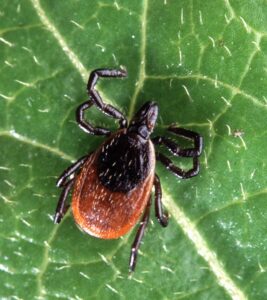
Happy Spring River Journalers! Today I’d like to share some tips on how to modify your yard to decrease the chances of ticks residing on your property and infecting your family with Lyme or other tick-borne illnesses.
Did you know?
The NYDEC and Centers for Disease Control and Prevention reported that New York has the third highest number of confirmed diagnosed Lyme Disease cases in the country. However, Lyme disease is not the only tick-borne illness. Others include Anaplasmosis and Ehrlichiosis, Babesiosis, Powassan virus disease and Rocky Mountain spotted fever.
Some common misconceptions about ticks:
- Ticks die in the winter. Ticks become dormant when the temperatures go below freezing but reemerge as soon as temperatures rise above 40 degrees.
- Ticks “jump”. Ticks find their prey by one of two methods, hiding in tall grasses and dropping down from above onto their target prey.
Ticks found commonly in Westchester County prefer moist damp areas and as wildlife and pest control operators it is our job to know the behavior and habits of ticks. If you follow these suggestions, they will help reduce the population of ticks residing on your property.
- Reduce Damp Locations On Your Property
- Clean up excess debris (rocks/plants) particularly debris that blocks or clogs drains/gutters. Here are some underground drainage gully products for sale.
- Fill in any indentations with topsoil to create a more level yard
- Aerate your yard to help break up compacted topsoil and help with overall drainage
- Install a French drain to carry water away from your foundation
- Remove plants that deer love to eat (deer being one of the most common prey for ticks). The following plants are native to New York; not only are they deer resistant, but they also serve our native pollinators:
- Butterfly Bush
- Milkweed
- Joe Pye Weed
- Black Eyed Susan
- Purple Cone Flower
- Blue Mist flower
- Keep your grass cut short (under 6”), as ticks like to reside in tall grass.
- Install a deer fence to keep deer off your property. Contact a fencing Townsville builder to install the fence for you.
Another way to reduce or eliminate ticks on your property is with a botanical insecticide treatment. The treatment most pest control services use is 100% organic and 25b exempt (meaning it poses little to no risk to people or the environment). Unlike other pesticides, botanical components act in the vapor phase and are classified as “true repellents”. When ticks come in their vicinity, they are repelled by the vapors. In contrast, synthetic pyrethroids are called excito-repellents; ticks must physically touch them to be repelled. Synthetic treatments can also be harmful to you and your pets.
If you have any questions about ticks or other pest issues, contact me at rex@wrexwildlife.com and I will be happy to provide you with any information that I can.
Have a happy and healthy Spring everybody.
 Chris Lee is the owner is Wrex Wildlife Services in Croton-on-Hudson. wrexwildlife.com
Chris Lee is the owner is Wrex Wildlife Services in Croton-on-Hudson. wrexwildlife.com






